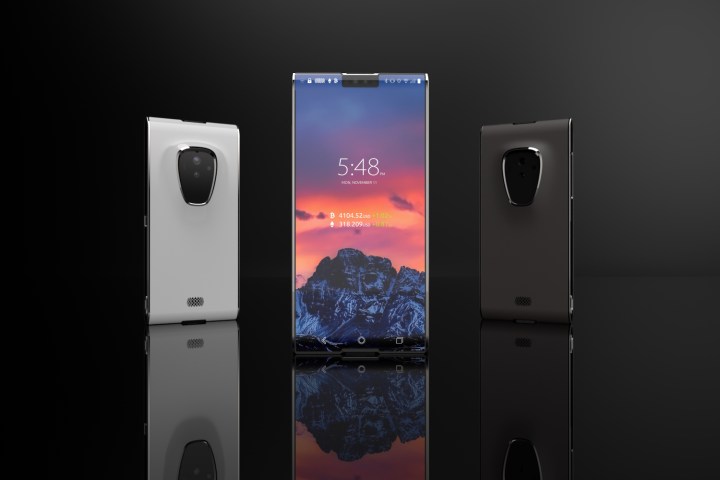
What does this actually mean? The Finney devices aren’t made for the, “Instagram generation,” but for people who are into cryptocurrencies, like Bitcoin, and require the highest security to store the coins, P2P sharing systems for payment, and encrypted communication tools. In case you’re wondering, the name is a homage to computer scientist Hal Finney, who received the world’s first Bitcoin transaction.

When asked to explain further, Sirin Labs CMO Nimrod May told Digital Trends: “This particular line of devices is aimed at the existing cryptocurrency community, [which] is heavily vested in and passionate about the propagation of the space and blockchain-based products and services it can bring about.”
Surely, you may ask, this is an incredibly niche market? May’s answer: “You’re absolutely right, most people haven’t heard of cryptocurrencies, but the team is betting heavily that the future will be cryptocurrency based. This is an early adopter community — for now — but we believe there is a large market opportunity right behind them.”
Let’s say you’re part of the crypto crowd; what does Finney offer? It’s two devices. A $1,000 smartphone and an $800 computer, both of which run a forked version of Android called Shield OS and Sirin Labs Cyber Protection Suite. Here’s a taste of what makes that special for anyone who understands cryptocurrencies and blockchain technology: Secure P2P sharing, built-in crypto wallet, tamper proof verification, secure text and emails, biometric authentication, and a behavioral-based Intrusion Prevention System to stop device attacks. If some of this sounds familiar, it’s because Sirin Labs has taken security features used in the Solarin phone, adapted them for Finney, and repackaged it for use with cryptocurrencies.
The phone has a 5.2-inch screen with a 2,560 x 1,440 pixel resolution, 8GB of RAM, 256GB of internal storage, a 16-megapixel rear camera, and a 12-megapixel wide-angle selfie camera. Sirin Labs hasn’t listed the processor, and didn’t answer our question on which one the phone will use. In the promotional render above, the Finney phone has an almost bezel-less screen, making it look very modern, and certainly considerably more attractive than the Solarin. The accompanying all-in-one computer is also a mystery, including how it will connect to the phone. A system similar to Samsung’s DeX dock is possible, but that is speculation on our part.
While the Solarin phone was available to buy soon after its launch, Sirin Labs is going down the crowdfunding route for Finney. It has not stated which platform will be used for crowdfunding, or when the devices are expected to be released. When Digital Trends asked to see the Finney devices, we were told it was too early for prototypes, so don’t expect it to be in the immediate future.
Also, don’t expect to use cash or a credit card to buy the Finney devices. You’ll need SRN tokens, which will be the default currency on the Finney blockchain network. We’ll assume SRN is Sirin Labs own cryptocurrency, and it’s likely through this that the company is banking on long-term success, rather than sales from the actual devices.
Editors' Recommendations
- PayPal vs. Google Pay vs. Venmo vs. Cash App vs. Apple Pay Cash
- The best Asus ROG Phone 2 accessories to help you master mobile games



